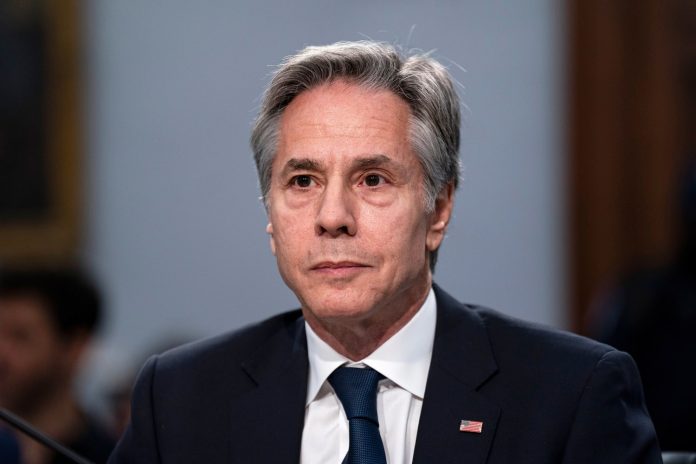U.S. Secretary of State Antony Blinken has decisively dismissed the notion of the United States purchasing Greenland, a proposal reintroduced by former President Donald Trump following his re-election in 2024. During a press briefing on January 8, 2025, Blinken described the idea as “not going to happen,” signaling the Biden administration’s firm stance against pursuing such controversial territorial ambitions.
This development marks the second time Trump has advocated for the acquisition of Greenland, an autonomous Danish territory. Initially floated during his presidency in 2019, the proposal was met with ridicule and sharp rejection from Denmark and Greenland. Danish Prime Minister Mette Frederiksen famously called it “absurd,” sparking a diplomatic rift that strained U.S.-Denmark relations. Despite the backlash, Trump appears determined to revisit the idea, framing it as a strategic necessity for the U.S.
Greenland’s Strategic Importance
Greenland occupies a vital position in the Arctic, a region of growing geopolitical significance. Its vast reserves of untapped natural resources, including oil, gas, and rare earth minerals, have attracted global attention. Additionally, the melting of Arctic ice due to climate change has opened new shipping routes, intensifying competition among world powers. Greenland also hosts the U.S. Thule Air Base, a critical military installation that supports missile defense and space surveillance operations.
Trump’s renewed interest in Greenland reflects his administration’s focus on expanding U.S. influence in the Arctic. On his social media platform, Truth Social, Trump described the island as a “strategic asset” and suggested that U.S. ownership would bolster national security. However, his comments have drawn criticism both domestically and internationally, with many questioning the feasibility and diplomatic implications of such a move.
International and Domestic Reactions
Blinken’s rejection of Trump’s proposal underscores the Biden administration’s commitment to diplomacy and respect for international sovereignty. Speaking at the briefing, Blinken emphasized the importance of working with allies to address shared challenges, particularly in the Arctic. He noted that the U.S. achieves better outcomes through collaboration rather than controversial actions that risk alienating key partners.
The Danish government has once again reiterated that Greenland is not for sale. Prime Minister Frederiksen, in a statement on January 9, 2025, reaffirmed Denmark’s stance, describing the island as “an integral part of our kingdom.” Greenlandic officials have also spoken out, highlighting the autonomy of their government and the importance of preserving their culture and identity.
Internationally, the proposal has raised concerns among European allies. French Foreign Minister Jean-Noël Barrot criticized the idea as a potential violation of European Union sovereignty, warning the U.S. to avoid undermining diplomatic ties. Meanwhile, Arctic researchers and environmental groups have urged world powers to focus on sustainable development and cooperation in the region rather than territorial disputes.
Domestically, Trump’s renewed push for Greenland has sparked mixed reactions. Supporters view it as a bold geopolitical move to strengthen U.S. dominance in the Arctic. Critics, however, see it as impractical and an unnecessary provocation that could harm U.S. relations with key allies.
The Arctic and U.S. Policy
The Arctic has become a focal point of global competition, with major powers like Russia and China ramping up their activities in the region. The U.S., under the Biden administration, has sought to strengthen alliances and prioritize multilateralism in addressing Arctic challenges. Blinken’s remarks reflect this approach, emphasizing collaboration on issues such as climate change, security, and sustainable resource development.
Experts have warned that pursuing unilateral actions, such as attempting to purchase Greenland, could undermine U.S. credibility and hinder efforts to build a unified strategy for the Arctic. Instead, they advocate for increased investment in Arctic research, infrastructure, and diplomacy to maintain the region’s stability.
A Reaffirmation of Diplomacy
Blinken’s decisive rejection of Trump’s Greenland proposal highlights a broader shift in U.S. foreign policy under the Biden administration. By prioritizing alliances and mutual respect, the U.S. aims to address global challenges collaboratively and responsibly. Greenland, with its strategic importance and rich resources, will undoubtedly remain a key player in Arctic geopolitics. However, Blinken’s statement makes it clear that any U.S. involvement will be grounded in partnership, not unilateral ambitions.
As global attention on the Arctic intensifies, the U.S. faces the challenge of balancing its strategic interests with the need to foster international cooperation. Blinken’s firm stance on Greenland signals a commitment to diplomacy and sets a precedent for how the U.S. engages with its allies in an increasingly contested region.
This controversy, while reigniting debates about Arctic policy, ultimately underscores the importance of fostering trust and collaboration in a rapidly changing world.
BY – NIKITA
ALSO READ, Trump Proposes U.S.-Canada Merger Following Trudeau’s Resignation




